ISLAMABAD: Shehbaz Sharif is set to begin a second term as Pakistan’s prime minister in coming days, returning to the role he had until August when parliament was dissolved ahead of last week’s elections.
Sharif, 72, was named by his party and coalition allies to head the nuclear-armed nation despite his elder brother and three-time Prime Minister Nawaz Sharif winning a seat in the assembly and being favorite to be sworn in for a fourth term.
Nawaz Sharif’s daughter Maryam said in a post on X that her father did not want to run a minority coalition government having had clear majorities in his three previous stints as premier. Their Pakistan Muslim League-Nawaz (PML-N) party controls only 80 seats in the 264-seat parliament but has been promised support by six other parties for a majority.
The younger Sharif played a key role in keeping together a coalition of disparate parties for 16 months after parliament voted former premier and rival Imran Khan out of office in 2022, and in securing a last gasp International Monetary Fund (IMF) deal in 2023.
Shehbaz Sharif became prime minister as the PML-N buried differences with the powerful military in the face of their common rival, Khan, who was at odds with top generals over policy differences.
At the time, Nawaz Sharif was in self-imposed exile in London and disqualified from holding public office.
Before his stint as prime minister, the younger Sharif was known more as a good administrator than a politician, having served as chief minister thrice in the country’s largest province, Punjab.
But as prime minister, he quickly took on the role of peacemaker between coalition parties often at odds with one another over key policies.
Shehbaz Sharif’s biggest achievement in his short tenure was clinching a bailout from the IMF with Pakistan on the brink of a debt default. The deal was signed after Sharif personally called on IMF chief Kristalina Georgieva last June.
However, under his government, inflation touched a high of 38 percent with record depreciation of the rupee currency — mainly due to structural reforms necessitated by the IMF program to stabilize the economy.
He blames the economic meltdown on Khan’s government, which he says broke an agreement with IMF just before he was ousted. Sharif said his government had to introduce a slew of reforms and scrap subsidies, causing inflation to surge.
KEY CHALLENGES
Pakistan continues to be enmeshed in the economic crisis with inflation remaining high, hovering around 30 percent, and economic growth slowing to around 2 percent.
Sharif will need to emulate his feat of securing a short-term IMF bailout with the current program expiring next month and a new extended deal needed to keep Pakistan on a narrow path to recovery.
But his main role will be to maintain ties with the military, which has directly or indirectly dominated Pakistan since independence. Unlike his elder brother, who has had a rocky relationship with the military in all his three terms, the younger Sharif is considered more acceptable and compliant by the generals, analysts say.
For several years, the military has denied it interferes in politics. But it has in the past directly intervened to topple civilian governments three times, and no prime minister has finished a full five-year term since independence in 1947.
Privatising some lumbering state giants, including the national airline, and securing foreign investment will also be key to ease the economic crisis. The Sharifs have close ties with rulers in Saudi Arabia and Qatar, which could help in securing investments in several projects Pakistan has lately showcased for sale.
Although defense and key foreign policy decisions are largely influenced by the military, Sharif will have to juggle relations with the US and China, both major allies. He is also faced with dealing with fraying ties with three of Pakistan’s four neighbors, India, Iran and Afghanistan.
‘WORKAHOLIC’
Sharif was born in the eastern city of Lahore in a wealthy Kashmiri-origin family that was in the steel business. He started his political career as the chief minister of Punjab in 1997 with a signature “can-do” administrative style.
His cabinet members and bureaucrats who have worked closely with him call him a workaholic.
As chief minister, the younger Sharif planned and executed a number of ambitious infrastructure mega-projects, including Pakistan’s first modern mass transport system in Lahore.
He was caught up in the national political upheaval when his brother was ousted from the premiership by a military coup in 1999 and he went into exile in Saudi Arabia.
Sharif entered the national political scene when he became the chief of the PML-N after the elder Sharif was found guilty in 2017 on charges of concealing assets related to the Panama Papers revelations.
Married twice, Shehbaz Sharif has two sons and two daughters from his first marriage but none from the second. One of the sons is in politics but the others are not in public life.
His second wife is Tehmina Durrani, the well-known author of “My Feudal Lord,” an autobiography about an abusive married life with an earlier husband.
Shehbaz Sharif set for Pakistan’s top job as elder brother steps aside
https://arab.news/6sb9e
Shehbaz Sharif set for Pakistan’s top job as elder brother steps aside
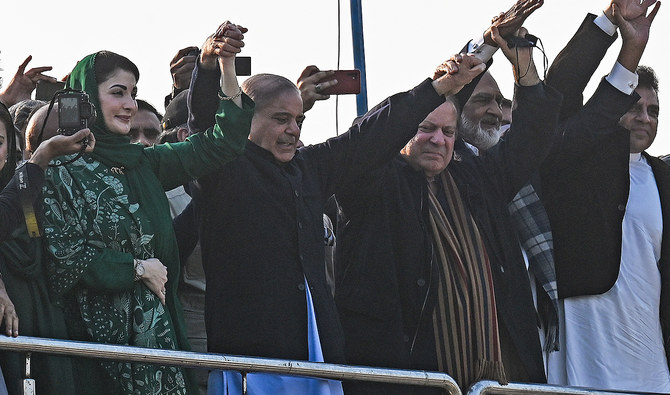
- Nawaz Sharif’s daughter Maryam said in a post on X that her father did not want to run a minority coalition government
- Younger Sharif played key role in keeping together coalition of disparate parties for 16 months between April 2022 to August 2023
Suspected militants bomb school for girls in northwestern Pakistan
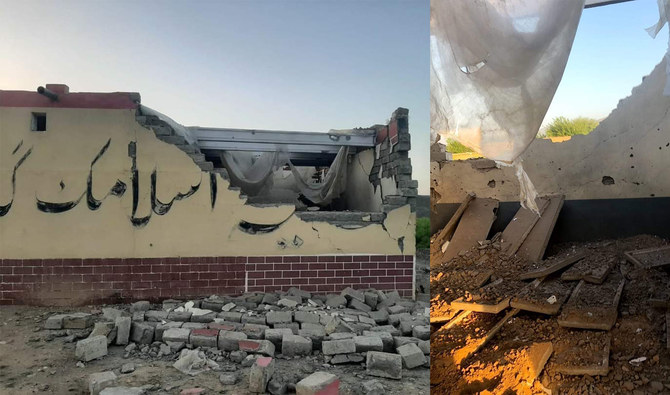
- No one harmed as militants blow up girls school in North Waziristan district, say police
- Pakistan witnessed attacks on girls’ schools until 2019 by militants opposed to female education
DERA ISMAIL KHAN, Pakistan: Militants detonated a bomb at a girls school in a former stronghold of the Pakistani Taliban in the country’s volatile northwest, badly damaging the structure, police said Thursday. No one was harmed in the overnight attack.
There was no immediate claim of responsibility for the attack late Wednesday that targeted the only girls school in Shawa, a town in the North Waziristan district in the Khyber Pakhtunkhwa province bordering Afghanistan, local police chief Amjad Wazir said.
UNICEF condemned the bombing as “despicable and cowardly act that could jeopardize the future of many young and talented girls.”
According to the police chief, the attackers first beat up the school guard before setting off the explosives at the private Aafia Islamic Girls Model School, which has 150 students.
Suspicion is likely to fall on Islamic militants and specifically the Pakistani Taliban, who have targeted girls schools in the province in the past, saying that women should not be educated.
In a statement, Abdullah Fadil, the UNICEF representative in Pakistan, said the “destruction of a girls’ school in a remote and underserved area is a heinous crime detrimental to national progress.” He cited Prime Minister Shehbaz Sharif statement on Wednesday declaring an education emergency and pledging to work toward enrolling 26 million out-of-school children.
Pakistan witnessed multiple attacks on girls schools until 2019, especially in the Swat Valley and elsewhere in the northwest where the Pakistani Taliban long controlled the former tribal regions. In 2012, the insurgents attacked Malala Yousafzai, a teenage student and advocate for the education of girls who went on to win the Nobel Peace Prize.
The Pakistani Taliban, known as Tehreek-e-Taliban Pakistan or TTP, were evicted from Swat and other regions in recent years. The TTP are a separate group but a close ally of the Afghan Taliban, who seized power in Afghanistan in 2021.
The Taliban takeover in neighboring Afghanistan has emboldened the Pakistani Taliban.
US CENTCOM commander, Pakistan Army chief discuss joint training, regional security
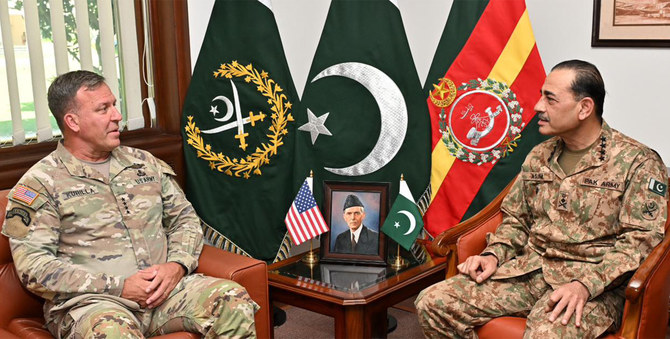
- US CENTCOM directs and enables military operations with allies and partners to increase regional security
- CENTCOM commander appreciated Pakistan Army’s contribution in war against “terrorism,” says army
ISLAMABAD: Pakistan’s Army Chief General Syed Asim Munir and General Michael Erik Kurilla, the commander of the US Central Command (CENTCOM) discussed regional security and joint training in a meeting on Thursday, the army’s media wing said.
US CENTCOM directs and enables military operations with its allies to increase regional security and promote US interests. Among its stated command priorities is to counter violent extremist organizations.
Pakistan has seen a surge in militant attacks in its Balochistan and Khyber Pakhtunkhwa (KP) provinces bordering Afghanistan since a fragile truce between the state and the Pakistani Taliban broke down in Nov. 2022.
Both Pakistan and US have collaborated over the years to take out militant organizations, especially in Pakistan’s restive tribal areas bordering Afghanistan.
Pakistan Army’s Inter-Services Public Relations (ISPR) said General Kurilla called on Munir at the army’s headquarters in Rawalpindi.
“During the meeting, matters of shared interests, particularly cooperation in regional security matters came under discussion,” the ISPR said.
“Both sides discussed avenues of joint training and reiterated the need for enhancing training interactions between CENTCOM and Pakistan Army.”
The ISPR said Kurilla acknowledged Pakistan Army’s success in its fight against “terrorism” and appreciated its continued efforts to bring peace and stability to the region.
Ties between Islamabad and Washington, once close allies, have just started to warm after some years of frosty relations, mostly due to concerns about Pakistan’s alleged support of the Taliban in Afghanistan. Pakistan denies this support.
Relations strained further under the government of former prime minister Imran Khan, who ruled from 2018-22 and antagonized Washington throughout his tenure, welcoming the Taliban takeover of Afghanistan in 2021 and later accusing Washington of being behind attempts to oust him. Washington has dismissed the accusation.
The government of PM Shehbaz Sharif that took over after Khan and whose term ended last year tried to mend ties but analysts widely believe the United States will not seek a significant broadening of ties with Islamabad in the near future but remain mostly focused on security cooperation, especially on counterterrorism and Afghanistan.
Pakistan’s foreign reserves with central bank surge past $9 billion after IMF inflows
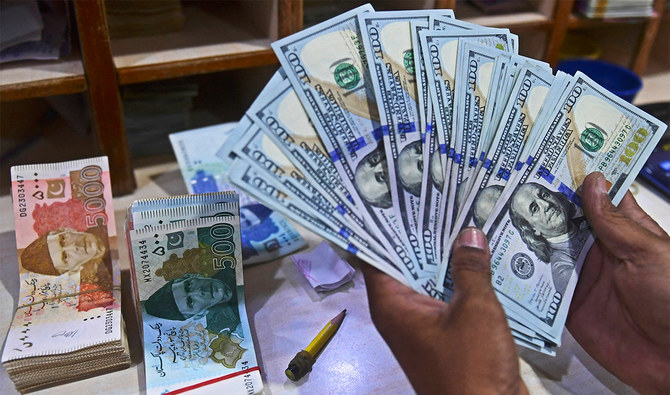
- Pakistan last month received $1.1 billion from IMF as final tranche of its $3 billion loan program
- Talks between IMF and Pakistan for a fresh loan program is expected to be held this month
KARACHI: Pakistan’s foreign exchange reserves with its central bank surged to $9.12 billion on Thursday, data from the State Bank of Pakistan (SBP) after Islamabad received the final tranche of $1.1 billion from the International Monetary Fund (IMF) last month.
The SBP confirmed on April 30 that Pakistan had received the final tranche of $1.1 billion as part of a $3 billion IMF loan program it entered last summer.
The South Asian country is expected to hold discussions this month with an IMF mission for a “larger and longer” program that Islamabad hopes would help avert its macroeconomic crisis.
“Foreign reserves held by the State Bank of Pakistan total $ 9,120.3 million,” the SBP said in a statement. It added that total reserves held by the country stood at $ 14,458.9 million, out of which net foreign reserves worth $ 5,338.6 million were by commercial banks.
Pakistan has been struggling with a chronic economic crisis since April 2022 that has seen its foreign exchange reserves plummet to historic lows and its national currency depreciate significantly against the US dollar.
The South Asian country has turned to international financial institutions and multilateral partners to secure external financing in a bid to stave off a balance of payment crisis.
Desperate to shore its foreign reserves, Pakistan has recently welcomed visits by business delegations and diplomats from Saudi Arabia, Japan, Qatar and Azerbaijan to attract investment.
Last year Pakistan set up the Special Investment Facilitation Council, a body consisting of Pakistani civilian and military leaders and specially tasked to promote investment in Pakistan. The council is so far focusing on investments in the energy, agriculture, mining, information technology and aviation sectors and specifically targeting Gulf nations.
Pakistan fast bowler Amir to miss first T20I against Ireland after visa delay
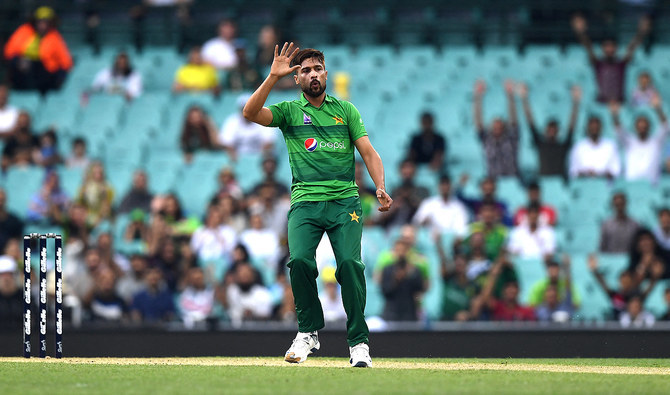
- Mohammad Amir gets travel visa, expected to join squad from Friday, confirms PCB
- Pakistan will play three T20Is against Ireland and four against England this month
ISLAMABAD: Left-arm fast bowler Mohammad Amir has received his travel visa but won’t make it in time to play the first T20I match against Ireland on Friday, the Pakistan Cricket Board (PCB) has confirmed.
Amir did not travel to Ireland with Pakistan’s squad this week due to visa delay issues. Pakistan will play a three-match T20I series against the Irish side from May 10-14 in Dublin before departing for the UK where they will play against England in a four-match T20I series.
“Fast bowler Mohammad Amir will miss the first T20I due to delays in the issuance of his visa,” the PCB said in a statement on Thursday. “He is expected to join the side on Friday.”
Amir, 32, came out of international retirement last month for the home series against New Zealand, drawn 2-2. The pacer is eyeing a spot in the 15-man squad for next month’s T20 World Cup in the Caribbean and the United States.
The three-match series in Dublin is also World Cup preparation as both teams are in the same group alongside India, US and Canada.
Amir will bolster Pakistan’s pace battery which comprises the likes of Naseem Shah, Shaheen Shah Afridi, and Haris Rauf.
Squads:
Ireland: Paul Stirling (captain), Mark Adair, Ross Adair, Andrew Balbirnie, Curtis Campher, Gareth Delany, George Dockrell, Graham Hume, Barry McCarthy, Neil Rock, Harry Tector, Lorcan Tucker, Ben White, Craig Young
Pakistan: Babar Azam (captain), Abrar Ahmed, Azam Khan, Fakhar Zaman, Haris Rauf, Hasan Ali, Iftikhar Ahmed, Imad Wasim, Mohammad Abbas Afridi, Mohammad Amir (unavailable for first T20I), Mohammad Rizwan, Muhammad Irfan Khan, Naseem Shah, Saim Ayub, Salman Ali Agha, Shadab Khan, Shaheen Shah Afridi and Usman Khan.
Pakistan to introduce new SOPs for security of Chinese nationals— interior minister
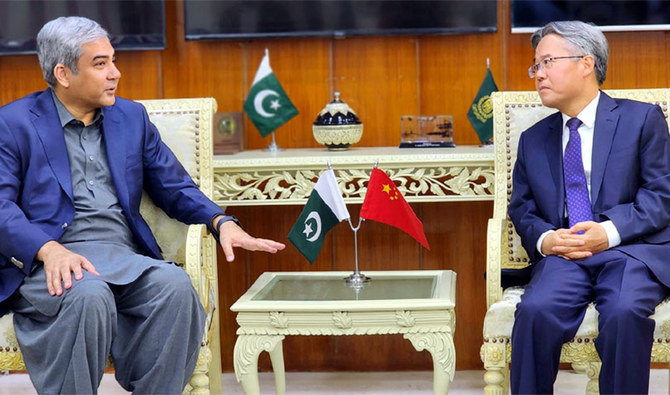
- Pakistan has recently witnessed surge in militant attacks on Chinese nationals
- A suicide attack in northwestern Pakistan in March killed five Chinese engineers
ISLAMABAD: Pakistan’s government will craft new standard operating procedures (SOPs) for the security of Chinese nationals working and living in the country, Interior Minister Mohsin Naqvi said on Thursday.
Pakistan has seen a rise in attacks on Chinese nationals in the country in recent months. A suicide bomber in March rammed his vehicle into a convoy of Chinese engineers working on a hydropower project in northwestern Pakistan. Five Chinese engineers were killed in the attack.
Pakistan has said it has since then taken steps to enhance the security of Chinese nationals in the country.
“Interior Minister Mohsin Naqvi says new Standard Operating Procedures (SOPs) related to the security of Chinese nationals will be crafted and it will be implemented in letter and spirit,” the state-run Radio Pakistan reported.
Naqvi was speaking to Chinese Ambassador to Pakistan Jiang Zaidong in Islamabad, the state media said, adding that he vowed to bring the perpetrators of the March attack to justice.
“Mohsin Naqvi said no conspiracy can sabotage the decades-old Pak-China friendship,” Radio Pakistan said.
Zaidong expressed satisfaction with the measures taken by Pakistani authorities for the security of Chinese nationals.
The Dasu attack was the third major one in a little over a week on China’s interests in the South Asian nation, where Beijing has invested over $65 billion in energy, infrastructure and other projects as part of its wider Belt and Road initiative.
Chinese interests in Pakistan’s southwestern Balochistan province have also been under attack primarily by militants who seek to push Beijing out of the mineral-rich territory.









